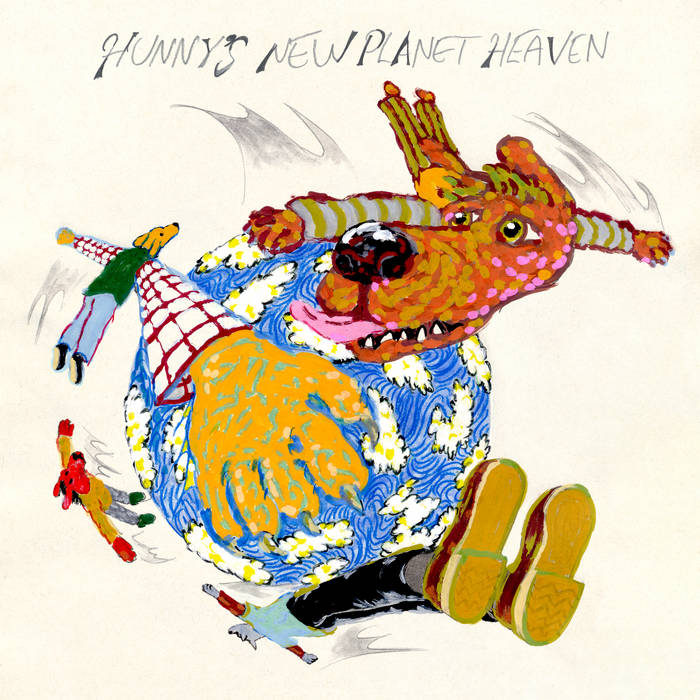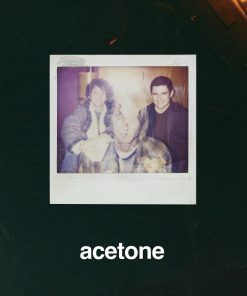Hunny – New Planet Heaven LP Epitaph
$ 25,98 Original price was: $ 25,98.$ 15,59Current price is: $ 15,59.
After a series of viral singles that established their spirited blend of spiky dance-rock, new wave, and punk-pop, SoCal natives HUNNY recorded their full-length debut, 2019’s Yes. Yes. Yes. Yes. Yes., with Grammy-winning engineer Carlos de la Garza (Paramore, Wolf Alice) in the producer’s chair. Although they were soon physically separated by the arrival of the COVID-19 pandemic, the bandmembers went to work on new songs and managed to complete nearly 100 demos that would be whittled down to a dozen tracks for the follow-up. Meanwhile, they decided on a looser, less polished approach — one that prioritized the band’s chemistry — and they eventually met with producer Derek Ted (Field Medic, Dora Jar) at his Los Angeles studio, nicknamed New Planet Heaven. The resulting album, HUNNY’S NEW PLANET HEAVEN, leaves in several instances of background noise and intro/outro clatter while touching on similar stylistic inspirations plus a few additional ones. The record opens sparsely with a quiet, melodic electronic loop and tinkling piano interjections behind a tender, conversational stanza from singer Jason Yarger that looks upon the passage of time with references to sensory objects like a skipping CD and cracked leather seats. When the full band joins in, it’s with driving rhythms and post-punky guitar tones, as Yarger insists, “It’s not bothering me/If it’s not bothering you.” The group take a punk-poppier turn on the dissonant yet still highly melodic “ring in ur ear,” featuring Motion City Soundtrack‘s Justin Courtney Pierre, as well as on tracks including “nothing amazing happens,” with its exasperated shouts of “class division.” Among the more stylistic not-quite-outliers are the druggy and drum-less, lost-in-thought “my own age” and the breakbeat-underscored “all my luck.” Essentially a love song, the latter track sets its easygoing tone with rippling extended chords. The mood throughout HUNNY’S NEW PLANET HEAVEN is, like the debut, pretty positive even on the more anxious songs, and while the album, for better or for worse, does come off as a “best-of” selection rather than a conceptual whole, that’s a good thing when it comes to the record’s hooks, melodicism, expanded variety, and apparent overall growth. -All Music Guide
Fast Shipping and Professional Packing
We offer a broad range of shipping options due to our long-running partnerships with UPS, FedEx and DHL. Our warehouse employees will pack all goods to our exacting requirements. Your items are carefully inspected and secured properly prior to shipping. We ship to thousands of customers every day from all over the world. This demonstrates our dedication to becoming the largest online retailer in the world. Warehouses and distribution centres can be located in Europe as well as the USA.
Note: Orders that contain more than one item will be assigned a processing date depending on the item.
We will carefully examine all items before sending. Today, the majority of orders will be shipped within 48 hours. The expected delivery time will be between 3 and 7 days.
Returns
Stock is dynamic. It's not completely managed by us, since we have multiple entities, including the factory and the storage. The actual inventory can fluctuate at any time. It is possible that the stocks could be depleted after your order has been processed.
Our policy lasts 30 days. If you haven't received the product within 30 days, we're not able to issue a refund or an exchange.
To be eligible for a refund the product must be unopened and in the same state as when you received it. The item must be returned in its original packaging.
Related products
Uncategorized
Uncategorized
Uncategorized
Uncategorized
Uncategorized
Uncategorized
Uncategorized
Uncategorized
Uncategorized
Acid Mothers Temple & The Melting Paraiso U.F.O. – Myth of the Love Electrique 2LP Riot Season (UK)
Uncategorized
Uncategorized
Uncategorized
Uncategorized
Uncategorized
Uncategorized
Uncategorized
Uncategorized
Uncategorized
Uncategorized
Uncategorized
Uncategorized



































